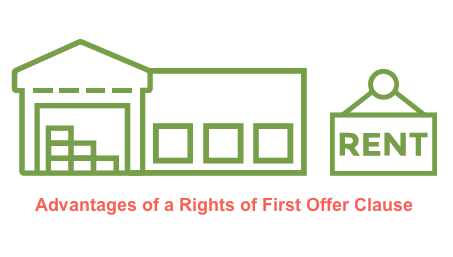

We launched our Toronto office in August, 2015 with a goal of better serving the third largest industrial market in North America. When we looked at a lease for office space, we had two objectives:
- Find space that reflected our brand
- Have flexibility in our lease so that we could scale rapidly if conditions warranted
Our home in St. Lawrence Market catered to both of these criteria – a short 1-year sub-lease in a building buzzing with high tech start-ups. As we approach our sublease expiry, we are proud of the fact we’ve grown, but are now faced with a situation where we need to expand our footprint, and ultimately relocate. Our clients face similar issues with their lease agreements and we are now reminded of the importance of having a lease that works for you and not against you.
For many of our clients, one lease term that we continually recommend and stress when considering relocation is negotiating Rights of First Offer (ROFO) on adjacent units or buildings.
ROFO’s come in many forms, but in a nutshell a ROFO is a lease clause that allows a tenant to claim the first opportunity to take over any vacant space within a business park that their Landlord controls.
We take great pride in helping our clients succeed and expand. Deciding on the ideal layout, software, location and material handling systems are the decisions that can make or break your success. Without a ROFO clause, clients can end up in a situation where their needs for incremental amounts of additional space precipitate an expensive, complete re-location.
To illustrate, here’s an example:
We have a client who manufactures and distributes from a multi-tenant facility. Strong growth has meant a need for an additional 60,000 sq.ft. of storage space. As we undertook the re-engineering of the entire facility, we determined that making adjustments to the existing manufacturing layout, while operationally advantageous – would be too cost prohibitive to justify the ROI. Imagine if the expansion needs had triggered a full-scale relocation of production and packaging lines? Fortunately, this client has a ROFO clause and we are now setting racks up in adjacent unit (of appropriate size) as I write this.
The process of lease negotiation often requires give and take from both landlord and tenant. In my experience, if a negotiation is positioned correctly (and the appropriate leverage is applied), a ROFO clause is one that can often be won, and ultimately inserted on behalf of a tenant. While a ROFO clause often means greater flexibility for a tenant, the advantage to the landlord is that it does not contribute to vacancy loss, or hinder profitability. This is the primary motivation of a landlord’s operating philosophy.
Your supply chain runs on infrastructure. That infrastructure requires constant injections of precious capital, so spending needlessly on this infrastructure bleeds capital away from other critical initiatives like developing new markets, opening stores or addressing other issues in your business. With this in mind, there are some key clauses you should have in your lease - like a ROFO – that can support future growth and prevent wasteful situations from occurring down the road.
Thinking of moving? Have a lease expiry approaching in the next 30 months? Give me a call at (416) 548-8659 or if you've still got some time, download this eBook Should I Stay or Should I Go, for helpful tips on how to avoid some pitfalls that could come back to haunt you.
